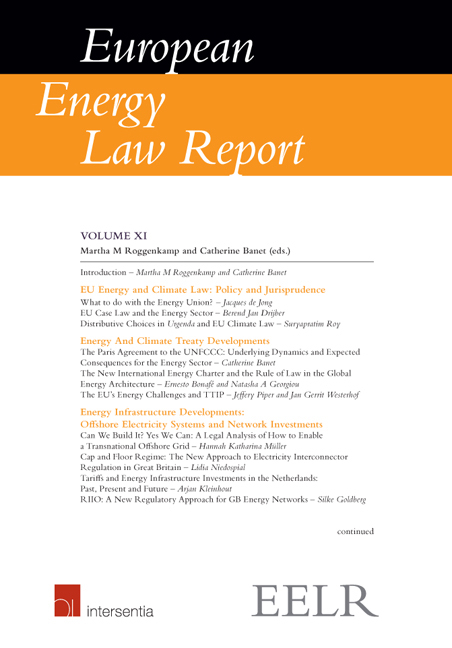Book contents
- Frontmatter
- Editorial
- Contents
- List of Abbreviations
- List of Contributors
- Introduction
- Part I EU Energy and Climate Law: Policy and Jurisprudence
- Part II Energy and Climate Treaty Developments
- Chapter IV The Paris Agreement to the UNFCCC: Underlying Dynamics and Expected Consequences for the Energy Sector
- Chapter V The New International Energy Charter and the Rule of Law in the Global Energy Architecture
- Chapter VI The EU's Energy Challenges and TTIP
- Part III Energy Infrastructure Developments: Offshore Electricity Systems and Network Investments
- Part IV Heat Supply Legislation in the Eu
- Part V Security of Energy Supply and Safety
Chapter VI - The EU's Energy Challenges and TTIP
from Part II - Energy and Climate Treaty Developments
Published online by Cambridge University Press: 29 September 2018
- Frontmatter
- Editorial
- Contents
- List of Abbreviations
- List of Contributors
- Introduction
- Part I EU Energy and Climate Law: Policy and Jurisprudence
- Part II Energy and Climate Treaty Developments
- Chapter IV The Paris Agreement to the UNFCCC: Underlying Dynamics and Expected Consequences for the Energy Sector
- Chapter V The New International Energy Charter and the Rule of Law in the Global Energy Architecture
- Chapter VI The EU's Energy Challenges and TTIP
- Part III Energy Infrastructure Developments: Offshore Electricity Systems and Network Investments
- Part IV Heat Supply Legislation in the Eu
- Part V Security of Energy Supply and Safety
Summary
EU ENERGY CHALLENGES
ENERGY SECURITY
Energy has been a core policy area of the European Union (EU) from the very beginning. Following the Schuman declaration of 1950, the forerunner of today's EU was the European Coal and Steel Community which paved the way for a new kind of peaceful cooperation in Europe. This was followed by the Euratom Treaty in 1957. However it is only with the entry into force of the Lisbon Treaty that the EU was given, in Article 194, an explicit competence in energy policy.
Geopolitical events such as the conflicts in the energy rich Middle East, the increasing competition for energy and the impact of climate change have all served to raise the profile of energy security, competitiveness and sustainability, and the need for the EU to be more active in the energy sector, while fully respecting the principle of subsidiarity.
The renewed crisis in Ukraine in early 2014 and the threat of a repeat of the gas crisis of early 2009, when a dispute between Russia and Ukraine resulted in a cessation of Russian gas through the Ukrainian transit system to the EU for two weeks, led the 28 EU Heads of State and Government in March 2014 to request the European Commission to ‘carry out an in-depth study of EU energy security and to present by June 2014 a comprehensive plan for the reduction of EU energy dependence’. The resulting Commission Communication on a European Energy Security Strategy noted that ‘too often energy security issues are addressed only at a national level without taking fully into account the interdependence of Member States. The key to improved energy security lies first in a more collective approach through a functioning internal market and greater cooperation at regional and European levels, in particular for coordinating network developments and opening up markets, and second, in a more coherent external action.’ It also underlined the importance of pursuing an active trade agenda in ensuring access to natural gas/liquefied natural gas (LNG) exports and oil export markets, and of limiting trade distortive practices by promoting strong energy-related trade disciplines and ensuring adequate enforcement of trade disciplines where appropriate.
- Type
- Chapter
- Information
- European Energy Law Report XI , pp. 121 - 142Publisher: IntersentiaPrint publication year: 2017



